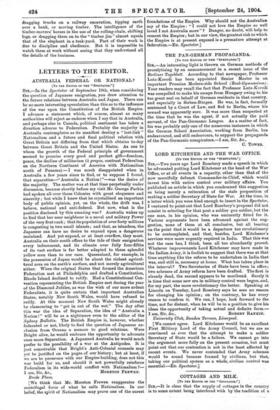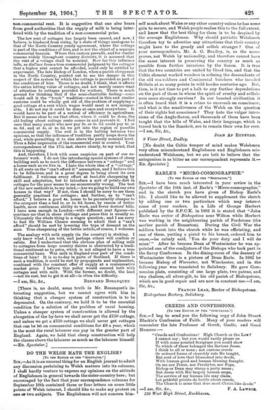non-commercial rent. It is suggestive that one also hears from
good authorities that the supply of milk is being inter- fered with by the tradition of a non-commercial price.
The low rent of cottages has largely been caused, and now, I believe, is hindered from rising, by a state of things analogous to that of the North Country yearly agreement, where the cottage is part of the conditions of hire, and is not the object of a separate commercial bargain. Where this custom prevails, and for similar reasons widely throughout country districts, it is assumed that the rent of a ‘,ottage shall be nominal. How far this influence tells, as diserricu from a true commercial judgment by the cottager that a higher rent cannot be afforded, could only be setttled by experiment. The late Bishop of London, when a parish clergyman in the North Country, pointed out to me the danger in this respect of the system by which the cottage is provided as part of the conditions of hire. There is no doubt, I think, that it affects -the entire letting value of cottages, and not merely causes want of attention to cottages provided for workers. There is much ground for thinking that if the semi-charitable feeling—some would call it the "truck" tradition—rooted in this and similar customs could be wholly got rid of, the problem of supplying a good cottage at a rent which wages would meet is not insuper- able. I do not say it could be done at once and everywhere. It would have to be part of a revival of efficiency in agriculture. But it seems clear to me that often, where it could be done, the old feeling about cottage rents comes in and prevents it. I feel sure that many people who now pay 3s. or 3s. 6d. could pay 4s. or 4s. 6d., and at 4s. or 4s. 6d. we get into the region of possible commercial supply. The evil is in the halting between two opinions, so that the influence of tradition partly keeps down the rent, while permitting it to rise above the purely nominal level. Thus a false impression of the commercial rent is created. Your correspondence of the 17th inst. shows clearly, to my mind, that this is happening. And, therefore, I look with some suspicion on part of our re- formers' work. I do not like introducing special systems of cheap building such as to mark the difference between a " cottage " and a house such as we live in. I hate the whole idea of a "cottage." It all rests on the "can't afford it" assumption, and I believe this to be fallacious, and in a great degree to bring about its own fulfilment. I welcome • every effort at bona-fide cheapening by skill and adaptation, but to introduce a sort of potato diet in cottages for the poor seems to me economically wrong. The test of the new methods is, to my mind,—Are we going to build our own houses in that way ? If not, then I should be sorry to see them generally practised for cottages ; and• further, as to "can't afford," I believe a good 4s. house to be pecuniarily cheaper to the occupant than a bad is. or is. 6d. house, by reason of better health, more continuous ability to work, and fewer doctors' bills. I have seen enough in London—with different rent figures—to convince me that in sheer shillings and pence this is usually so. Ultimately the whole thing is a wages question ; and I am sorry to find Sir William Chance seeming to admit that a "can't afford" should be met by lowering the type of demand on the man. True cheapening of the better article, of course, I welcome.
The analogy with milk supply (in the country) is striking. I only know what I am told, and perhaps others will confirm or refute. But I understand that the obvious plan of selling milk to cottagers from large country dairies is obstructed by a tradi- tional sentiment as to price, which is not alleged to have a true commercial basis. Was milk in England ever part of the condi- tions of hire? It is so to-day in parts of Scotland. If there is such a tradition, it could be met by propaganda and explanation, combined with the constant offer of supply at a remunerative market price. I believe this policy would succeed both with cottages and with milk. With the former, no doubt, the land —not its cost, but to get it at all—is often the difficulty.
[There is, no doubt, some truth in Mr. Bosanquet's in- teresting suggestion, but we cannot agree with him in thinking that a cheaper system of construction is to be deprecated. On the contrary, we hold it to be the essential condition for a solution of the problem of rural housing. Unless a cheaper system of construction is allowed by the abrogation of the by.-laws we shall never get the 2150 cottage, and unless we get a 2150 cottage we shall never get cottages that can be let on commercial conditions for a a year, which is the most the rural labourer can pay in the greater part of England. Again, we hold that cheap construction will help the classes above the labourer as much as the labourer himself.
—En. Spectator.]







































 Previous page
Previous page